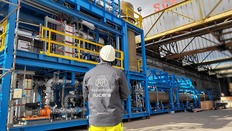- The agreement secures over 700MW capacity for the electrolysis plant in Boden, Sweden.
- thyssenkrupp nucera will provide alkaline water electrolysis technology and engineering.
- The plant will use green hydrogen to reduce iron ore to sponge iron for steel production.
- The project is supported by Sweden's Industrial Leap programme led by the Swedish Energy Agency.

Agreement Overview
The agreement between thyssenkrupp nucera and H2 Green Steel secures over 700MW capacity for an electrolysis plant in Boden, Sweden. This plant is set to become one of the largest electrolysis facilities globally.
Technology and Engineering
thyssenkrupp nucera will provide alkaline water electrolysis (AWE) technology and large-scale plant engineering. The company has a proven track record with over 600 installed projects and more than 10 GW capacity in chlor-alkali technology, which forms the basis for its 20 MW standard AWE module.
Project Significance
The collaboration aims to decarbonize the steel industry by producing green hydrogen on-site, which will be used in a direct reduction process to convert iron ore into sponge iron. This process is crucial for the production of green steel and will also contribute to new patented intellectual property assets.
Support and Collaboration
The project is supported by Sweden’s Industrial Leap programme, led by the Swedish Energy Agency. H2 Green Steel is partnering with various world-leading experts in design, construction, equipment, operations, and financing to build the giga-scale electrolysis plant.

